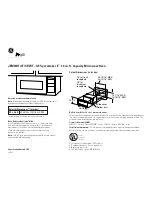
- 19 -
Cooking Instructions
COOKWARE
1. Heat-proof glassware, such as Pyroceram and
Pyrex, is best suited for use in the microwave oven.
2. Do not use metal ware, ceramics trimmed with gold
or silver, or any container with a metal content.
3. If “arcing” should occur, check the cookware
carefully again for metal.
4. You may use ordinary glassware, chinaware,
plastic-ware and paper-ware, when cooking food
that requires a low temperature. Using this type of
cookware for high temperature cooking may cause
cracking or warping.
5. You can cook steamed vegetables in special “see-
through” wrapping film, such as Saran Wrap, or wax
paper. Do not cook in plastic bags.
CAUTION
Do not use METAL UTENSILS in this oven.
OTHER HELPFUL
INSTRUCTIONS
FOR BEST RESULTS
1. When determining heating time for particular foods,
always select minimum time and check occasionally
during cooking for progress. The microwave oven
cooks so quickly, therefore it is easy to overcook
food.
2. Be careful of the cooking time for small quantities of
foods, or foods with low water content. They may
burn if cooked too long.
3. Do not use the oven for drying kitchen towels or
napkins. They may burn if heated too long.
4. Do not try to boil eggs in the oven.
5. When you cook an egg be sure to pierce the yolk
membrane prior to placing into the oven to prevent
the egg bursting.
6. To achieve more even cooking result, give the dish
a half-turn, or turn the food over.
DEFROSTING FROZEN
FOODS
1. If you try to completely defrost frozen foods in the
microwave oven, uneven defrosting may occur due
to the differences in the thickness and shape of the
food. Drip may also result, and sometimes a part of
the food cooks although other parts still remain
frozen. In actual usage of frozen foods, you should
not normally defrost them 100%. 70% defrosting in
the microwave oven is ideal and helpful for the next
cooking operation.
2. To defrost evenly, turn over or rearrange the food
during defrosting.
3. To defrost fatty meat, heat it in the microwave oven
for a short time and leave it to stand at room
temperature, or heat it intermittently until defrosted.
4. When you defrost a whole chicken, or any frozen
food of irregular shape, wrap legs or thin parts with
aluminum foil. Otherwise thin parts will be defrosted
faster and sometimes cooked before other parts
have properly defrosted. For big pieces of meat,
wrap the sides with aluminum foil so that they will
be uniformly thawed by vertical microwaves only.
5. Ice should be removed during defrosting.





































